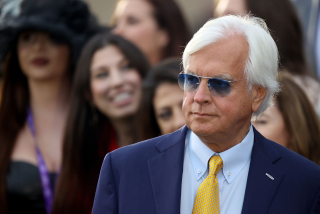Court Rules Catamaran to Sail in America’s Cup
- Share via
SAN DIEGO — Sail America officials hailed the decision, but New Zealander Peter Debreceny saw it as a prelude to possible disaster Monday when a New York judge ordered the San Diego Yacht Club and its New Zealand challenger to proceed with the America’s Cup races in September.
New York State Supreme Court Justice Carmen B. Ciparick’s ruling ended, at least temporarily, a legal battle over the type of boat that will be used by the Americans to defend the Cup. Sail America will sail its controversial twin-hulled catamaran against New Zealand’s 90-foot single hull.
“The time has come for the sailors to be permitted to participate in the America’s Cup,” Ciparick said. “The parties are directed to proceed with the races and to reserve their protests, if any, until after the completion of the America’s Cup races.”
She ordered the races to begin Sept. 19, but officials from San Diego and New Zealand said that there is a possibility of a Sept. 3 starting date, so that the regatta will not be held during the Olympics, which will begin Sept. 17.
Dennis Conner, who skippered the yacht Stars & Stripes in races at Freemantle, Australia, in February of 1987, regaining the Cup from an Australian sailing syndicate, said Ciparick’s ruling was a victory for the U.S. side.
“It’s a big day for Sail America, the Stars & Stripes and most of the sailing world,” Conner said. “The good news is that we have a race for the America’s Cup, and the race is in the water, not in the courtroom.”
Debreceny of the challenging Mercury Bay Boating Club of Auckland, New Zealand, said: “The Cup has always involved sailing challenges between similar boats, but the judge has ordered us to sail, and we are ready to sail, mismatch or not.”
But he added: “If it’s a mismatch, it will destroy the future of the America’s Cup.”
The controversy erupted last November when Michael Fay and the Mercury Bay Club issued a surprise challenge for this year. Fay’s boat, a radical 90-foot monohull, was to be the sole challenger and there would be none of the customary trial rounds involving boats from several countries. In the last 30 years, America’s Cup regattas have featured 12-meter boats, about 45-feet long at the waterline. When the San Diego club refused the challenge, Fay sued and Ciparick found the challenge valid.
Conner and officials of Sail America--the syndicate hired to run and promote the race--then decided to race with the catamaran, which will also be called Stars & Stripes.
Fay had argued in court that the San Diego Yacht Club should be held in contempt for using a multihulled boat. According to Fay’s lawsuit, the Deed of Gift--the document that has served as the America’s Cup rule book for more than 100 years--prohibited the use of multihulled boats and required both parties to use “like or similar” boats. The New Zealand millionaire also argued that the deed allowed the challenger to dictate the size and type of yacht to be used by the defender.
But that argument was rejected--at least for the moment--by Ciparick, who ruled that the deed’s language is unclear. The issue was decided in New York court because the New York Yacht Club is the caretaker of the Cup.
“Neither this court’s order, nor the terms of the Deed of Gift incorporated therein, so unequivocally state that multihulled boats are prohibited or that a defender must face the challenger in a like or similar yacht,” said Ciparick, who also denied a request by an English yacht club to join the race.
Tom Ehman, executive vice president of Sail America, said that Sail America and yacht club officials interpreted Ciparick’s ruling as meaning that Fay could not dictate the type of boat to be used.
However, Ciparick’s opinion apparently allows Fay an opportunity to file another court challenge after the races.
“Nothing in this decision should be interpreted as indicating that multihulled boats are either permitted or barred under the America’s Cup Deed of Gift,” the judge wrote.
And Fay said that he would file a protest and another lawsuit if Conner, who will defend the Cup, sails in a multihulled boat and wins. Fay said that he would base the lawsuit in part on Ciparick’s written opinion, which also said that she could not find the San Diego Yacht Club in contempt until the day of the first race, because any “improper act” would occur in the future.
Fay, who also used the deed to force Conner to defend the Cup this year instead of 1991, as originally planned, said that he would accept the judge’s ruling, but all but conceded the race. He argued that his monohull would not stand a chance against Conner’s catamaran.
“Yachtsmen and sportsmen around the world know that the America’s Cup is a match. It is not a mismatch,” he said. “The general consensus is that we’re beaten before we go to the starting line.”
Conner said that the race is anything but certain and suggested that Fay might be using a bit of psychology to make the U.S. team overconfident.
“The boats are quite close in speed . . . closer than the people on the New Zealand side predicted,” Conner said. “Those of you who think that this thing will be a walkaway will be quite surprised, because that’s not the way we see it.”
More to Read
Sign up for The Wild
We’ll help you find the best places to hike, bike and run, as well as the perfect silent spots for meditation and yoga.
You may occasionally receive promotional content from the Los Angeles Times.






